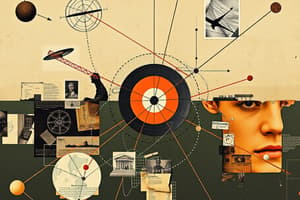Podcast
Questions and Answers
When did the early modern period begin?
When did the early modern period begin?
- Around 1800 AD
- After World War II
- Around 1500 AD (correct)
- After the Napoleonic Wars
When did the late modern period begin?
When did the late modern period begin?
- After the Napoleonic Wars
- Around 1500 AD
- After World War II
- Around 1800 AD (correct)
What significant events marked the early modern period?
What significant events marked the early modern period?
- The Crusades and the Black Death
- The Middle Ages and the Renaissance
- The Age of Enlightenment and the Industrial Revolution (correct)
- The American Civil War and the Spanish Inquisition
What major transition characterized the late modern period?
What major transition characterized the late modern period?
What does contemporary history refer to?
What does contemporary history refer to?
What historical period succeeded the Middle Ages?
What historical period succeeded the Middle Ages?
Which event is associated with the early modern period?
Which event is associated with the early modern period?
What marked the late modern period's transition?
What marked the late modern period's transition?
When did contemporary history begin?
When did contemporary history begin?
What are some significant developments in the modern period?
What are some significant developments in the modern period?
Flashcards are hidden until you start studying
Study Notes
Periods in History
- The early modern period began in the 15th century (approximately 1450-1500).
Characteristics of Periods
- The late modern period began in the 18th century (approximately 1750).
- A significant transition characterized the late modern period: the Industrial Revolution.
- The early modern period was marked by significant events such as the Renaissance, the Enlightenment, and the Age of Exploration.
Historical Periods
- Contemporary history refers to the period from approximately 1945 to the present.
- The historical period that succeeded the Middle Ages is the Modern Period.
- The event associated with the early modern period is the Renaissance.
- The late modern period's transition was marked by the Industrial Revolution.
- Contemporary history began after World War II, around 1945.
Developments in the Modern Period
- Some significant developments in the modern period include:
- The Enlightenment's emphasis on reason and individualism
- The emergence of nation-states and colonialism
- Major scientific discoveries and technological advancements
Studying That Suits You
Use AI to generate personalized quizzes and flashcards to suit your learning preferences.




